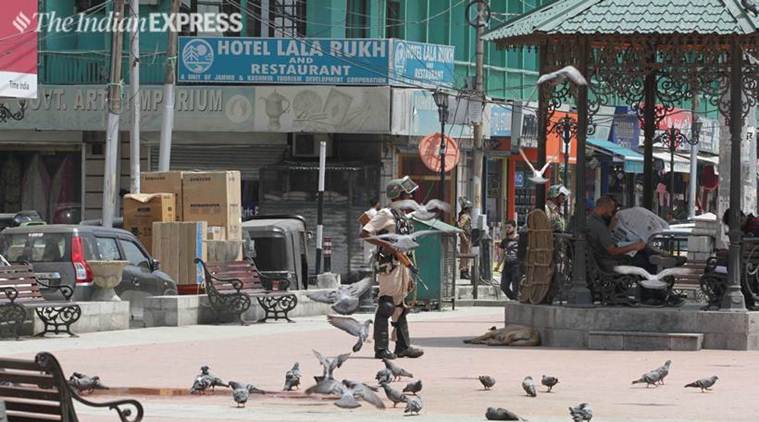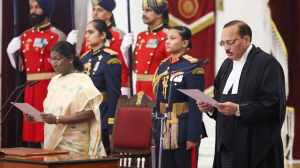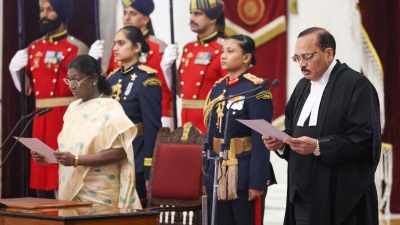
The move also allows other citizens of India to settle in the two proposed UTs — in the exercise of the fundamental right to move freely throughout the territory of India and to reside and settle in any part of India guaranteed under Article 19.
All laws passed by Parliament will be extended to the proposed UTs without exception. Earlier, every legislation, except on defence, external affairs and communications began with an exception clause stating that the law will apply to the whole of India except Jammu and Kashmir. The state that is now governed through its own constitution is set to lose legal status; the state flag would also lack recognition. The red flag with a plough and three stripes — representing the regions of Jammu, Kashmir and Ladakh — was hoisted along with the tricolour.
One of the most important amendments proposed will be related to The Transfer of Property Act. The Jammu and Kashmir Reorganisation Bill, 2019, passed in the Rajya Sabha, proposes to omit Sections 139 and 140 of the Act which would allow the transfer of immovable property in favour of non-permanent residents of the state.
Explained | What has changed in Jammu and Kashmir? All your questions answered
Similarly, the Bill proposes to amend the Jammu and Kashmir Land Grants Act — allowing promoters to be non-residents who can get the land on lease. The Wakf Act, that deals with regulation of movable or immovable properties for religious and charitable purposes as recognized by Muslim law, is also proposed to be applicable to the region.
Story continues below this ad
The other significant change will be regarding criminal law. The Bill proposes to apply at least half a dozen laws related to the criminal justice system. The Indian Penal Code, the Criminal Procedure Code and the Indian Evidence Act — the most important statutes governing criminal trials will now apply. The other important criminal laws applicable to the region would be: National Security Act, Prevention of Corruption Act, Scheduled Caste and the Scheduled Tribes (Prevention of Atrocities) Act, The Protection of Children From Sexual Offences Act and The Juvenile Justice (Care & Protection of Children) Act.
Three pieces of legislation related to the protection of women and children that were not enacted by the Jammu & Kashmir Assembly and are now proposed under the bill are: The Dowry Prohibition Act, 1961; The Prohibition of Child Marriage Act and Indecent Representation of Women (Prohibition) Act, 1986. The Bill also proposes that Whistle Blowers Protection Act, 2014 applicable to the region.
EXPRESS EDIT/OPINION | Edit: Rupture in history, stitching a future | PB Mehta writes: Blood and betrayal | Ram Madhav writes: Correcting a historic blunder | Manish Sabharwal writes: For Naya Kashmir | Imad Ul Riyaz writes: We are just at the beginning | C. Raja Mohan writes: Possibilities in the Northwest
Two important, rights-based central legislation The Right to Information Act, 2005 and the Right to Fair Compensation and Transparency in Land Acquisition, Rehabilitation and Resettlement Act, 2013 are also proposed to be applicable. Among personal laws, the Muslim Women (Protection of Rights on Divorce) Act, 1986 and the Special Marriage Act enacted by Parliament and currently not applicable to the region are also proposed to be applicable. Other personal laws enacted by the Centre, The Hindu Succession Act, 1956; and The Muslim Personal Law (Shariet) Application Act, 1937; are proposed to be applicable to the region.
Story continues below this ad
The High Court of Jammu and Kashmir shall continue to be the common constitutional court for both the proposed UTs. The Bill also states that the power to make to laws relating to All India Services and Anti-Corruption Bureau will lie solely with the Lieutenant Governor. These two issues along were major points of disagreement between the Delhi government and the Centre. The issue was finally decided by the Supreme Court in February 2019 in a landmark verdict where the court upheld the powers of the Centre on anti-corruption bureau while on services, the court delivered a split verdict and referred the issue to a larger bench.
Under Section 73 of the Bill, the President can suspend any or all provisions of the law if a situation arises where it is necessary or expedient to do so in the light of failure of constitutional machinery. This move can be made by the President, acting on a report from the Lieutenant Governor or otherwise. Unlike a state which is governed by its elected government, a UT is an administrative unit governed directly by the Central government. In UTs that have a legislature, the L-G governs in consultation with the elected government. If the Bill becomes law, J&K and Ladakh will be added to the First Schedule of the Constitution along with seven existing UTs.
The Presidential Order, 2019 also extended the application of Article 376 of the Constitution, a provision that deals with the interpretation of the Constitution to Jammu and Kashmir. The notification clarified that the legislature of Jammu and Kashmir shall be deemed to be the erstwhile constituent assembly of Jammu and Kashmir, the government of Jammu and Kashmir to mean the Governor of the state acting on the aid and advice of the Council of Ministers.
These changes, in effect, pave the way to potentially abrogate Article 370 since the provision can only be declared inoperable with the consent of the constituent assembly of Jammu and Kashmir. Incidentally, the Presidential Order, 2019 notified in the official gazette is issued, exercising the President’s powers under Article 370 sub section 1(d) that empowers him to extend Indian laws to Jammu and Kashmir.
Click for our complete coverage on Jammu and Kashmir

 One of the most important amendments proposed will be related to The Transfer of Property Act.
One of the most important amendments proposed will be related to The Transfer of Property Act.







